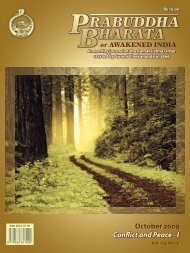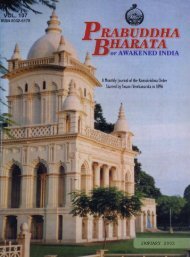October 2011 - Advaita Ashrama
October 2011 - Advaita Ashrama
October 2011 - Advaita Ashrama
You also want an ePaper? Increase the reach of your titles
YUMPU automatically turns print PDFs into web optimized ePapers that Google loves.
52<br />
come only after she had received at least a million<br />
signs. Then Helen would begin to internally<br />
assimilate the outer sign along with her mental<br />
‘sight’ of the object. Thus, the long road to<br />
Helen’s awakening was launched—a battle from<br />
start to finish. Helen kicked, bit, and hit Anne;<br />
she threw water into her face. In fact, the first day<br />
that Anne arrived Helen managed to lock her<br />
into her second-storey room and hid the key so<br />
that Anne could only be rescued from the rooftop<br />
by the Captain, Helen’s father. But Anne was<br />
undaunted, and she quickly saw the real problem:<br />
Helen’s parents, who hopelessly enabled their<br />
child’s tantrums by indulging her. The morning<br />
after Anne’s arrival, at breakfast, she was stunned<br />
when the Captain and his wife gave Helen a piece<br />
of cake in order to stop her tantrums.<br />
‘Why do you reward her for this behaviour?’<br />
she asked them.<br />
‘Have you no pity on our little Helen?’ was<br />
their only defence.<br />
But when Helen began to circle the breakfast<br />
table, grabbing food from each family member’s<br />
plate and eating it, Anne refused to tolerate such<br />
behaviour. She demanded that both parents cease<br />
indulging Helen, but the parents refused. ‘Leave<br />
this house! ’ they threatened, but Anne stood<br />
her ground and demanded that they leave the<br />
dining room so that she could work with Helen<br />
alone. Somehow Anne convinced both parents<br />
to step outside the house to avoid the three-hour<br />
tantrum that ensued. From the outside Helen’s<br />
parents shuddered as they heard their daughter’s<br />
screams amidst the crashes of china and silverware,<br />
overturned chairs, broken water pitchers,<br />
and the splatter of scrambled eggs splayed all<br />
over their posh antiques and dining room floor.<br />
Finally, when the dining room became quiet,<br />
Anne unlocked the door and ushered the parents<br />
back into their house. ‘Helen,’ Anne declared,<br />
‘has learned to eat with her spoon and fold her<br />
656<br />
Prabuddha Bharata<br />
napkin.’ This was not only a victory for Anne,<br />
but a major turning point in Helen’s life.<br />
Anne was the kind of teacher that Ramakrishna<br />
would have called ‘superior’. ‘There are<br />
three classes of physicians,’ he used to tell his disciples,<br />
‘superior, mediocre, inferior.’<br />
The physician who feels the patient’s pulse and<br />
just says to him, ‘Take the medicine regularly’<br />
belongs to the inferior class. He doesn’t care to<br />
inquire whether or not the patient has actually<br />
taken the medicine. The mediocre physician is<br />
he who in various ways persuades the patient<br />
to take the medicine and says to him sweetly:<br />
‘My good man, how will you be cured unless<br />
you use the medicine? Take this medicine. I<br />
have made it for you myself.’ But he who, finding<br />
the patient stubbornly refusing to take the<br />
medicine, forces it down his throat, going so far<br />
as to put his knee on the patient’s chest, is the<br />
best physician.25<br />
Ramakrishna, along with other great teachers,<br />
asserted that all knowledge is within, and<br />
Vivekananda used to reiterate his master’s<br />
teaching by adding that even in a child this<br />
knowledge requires only an awakening from the<br />
teacher.26 Indeed, Anne possessed this attitude<br />
toward her student to an extraordinary extent,<br />
and with great persistence she was able to teach<br />
the recalcitrant Helen obedience and manners<br />
so that even her parents were no longer embarrassed<br />
by their child.<br />
But Anne was unstoppable. ‘What Helen<br />
needs is more than obedience,’ she told them.<br />
‘She needs to learn. She can learn; she is bright.<br />
It is all there. And that is why,’ she added, ‘I<br />
must take her to a separate cottage on the property—away<br />
from your influence.’ Vivekananda<br />
would have agreed with Anne. Helen required<br />
a guru kula environment, a haven away from<br />
the distractions of the world and authority figures<br />
that unwittingly diverted or suffocated her<br />
PB <strong>October</strong> <strong>2011</strong>

















